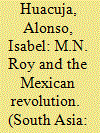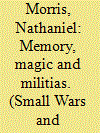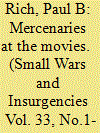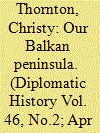|
|
|
Sort Order |
|
|
|
Items / Page
|
|
|
|
|
|
|
| Srl | Item |
| 1 |
ID:
177193


|
|
|
|
|
| Summary/Abstract |
This article explores the links forged between members of the Ghadar Movement and Mexican radical activists and organisers in North America during the early twentieth century. It argues that during the opening two decades of the century, Mexico and its convulsed politics offered radical anti-colonial Indian activists in North America an inspiring example and a source of important tactical, symbolic and ideological resources in their fight against imperialism and oppression. By exploring the points of contact, proximity and affinity between Indian and Mexican radicals in the years prior to and immediately after 1917, I argue that the turbulent politics of revolutionary Mexico and the thrust of Indian anti-colonialism came together in marginal but meaningful ways at a time of global revolutionary change.
|
|
|
|
|
|
|
|
|
|
|
|
|
|
|
|
| 2 |
ID:
154552


|
|
|
|
|
| Summary/Abstract |
This essay examines the Indian anti-colonial and Leftist activist M.N. Roy's political work in Mexico from 1918 to 1920. It argues that Roy's sojourn in revolutionary Mexico—and in particular the friendships he made there with Leftist intellectuals, some Mexican, many newcomers to Mexico—played an important role in shaping his political trajectory. Not only did Roy become a communist in Mexico, but he and his colleagues, concerned with the ‘universal’ struggle of the working class, dismissed ideas about national identity brewing during the Mexican Revolution and its aftermath. Roy's distaste for national pride also defined his later political work in India.
|
|
|
|
|
|
|
|
|
|
|
|
|
|
|
|
| 3 |
ID:
168209


|
|
|
|
|
| Summary/Abstract |
Mexico’s Cora Indians have played an outsized role in national history, thanks to their skilful use of guerrilla tactics and success in forging strategic alliances with outside forces in defence of their cultural, territorial and political autonomy. Cora participation in elite struggles between Liberals and Conservatives (1850–73), and subsequently in the Mexican Revolution (1910–20), helped to shape the way that both conflicts played out in Western Mexico. Such participation also allowed Cora communities to keep hold of traditional landholdings in the face of political and economic reform, while sowing the seeds for the foundation of the Mexican state of Nayarit.
|
|
|
|
|
|
|
|
|
|
|
|
|
|
|
|
| 4 |
ID:
188322


|
|
|
|
|
| Summary/Abstract |
This paper examines cinematic representations of mercenaries from the era of silent movies to the 1980s. It argues that cinema has been selective in the choice of historical periods to depict mercenaries and soldiers of fortune, ignoring for the most part the centuries of European state building in which mercenaries played a significant role. Most mercenary films are anchored in the near present and the paper focuses on Mexico and the Congo as terrains of political breakdown and external intervention. Since the 1950s, a range of films depict mercenaries in these terrains seeking money, adventure, and the thrills of killing, and the paper examines mercenary movies through the character structures of hero, anti-hero and villain. These three structures have shaped the portrayal of mercenaries in westerns and war movies as well as action and sci fi movies, where they have become hardened in the last two decades into range of stock stereotypes
|
|
|
|
|
|
|
|
|
|
|
|
|
|
|
|
| 5 |
ID:
185597


|
|
|
|
|
| Summary/Abstract |
The debate over whether the United States should join the League of Nations, an intense and sometimes acrimonious battle that pitched Republican against Democrat, president against congress, and reservationist against irreconcilable, was fought on a complicated terrain. The world order as it had existed had been shattered, and a new battle emerged between world leaders over what might replace it. The question of how to deal with vanquished enemies was crucial, of course, as was the dispensation of colonial territory; the map of Europe and its imperial possessions would be redrawn. The role that the United States should play—militarily, financially, and politically—was a key question, and U.S. President Woodrow Wilson provided an answer with the promulgation of the Fourteen Points and the proposal for a League of Nations.1 For a surprising number of participants in the League debate, however, the question of world order turned not just on British Naval supremacy, German war reparations, or the borders of French territory, but on a problem half a world away from Europe: the Mexican revolution. Theodore Roosevelt probably put the connection in its starkest terms, in a phrase he used repeatedly in the columns he wrote about the proposed League in the weeks before his sudden death. “Mexico is our Balkan Peninsula,” he wrote in a denunciation of the League on Christmas Eve 1918, adding ominously: “Some day we will have to deal with it.”2
|
|
|
|
|
|
|
|
|
|
|
|
|
|
|
|
| 6 |
ID:
053361


|
|
|
|
|
|
|
|